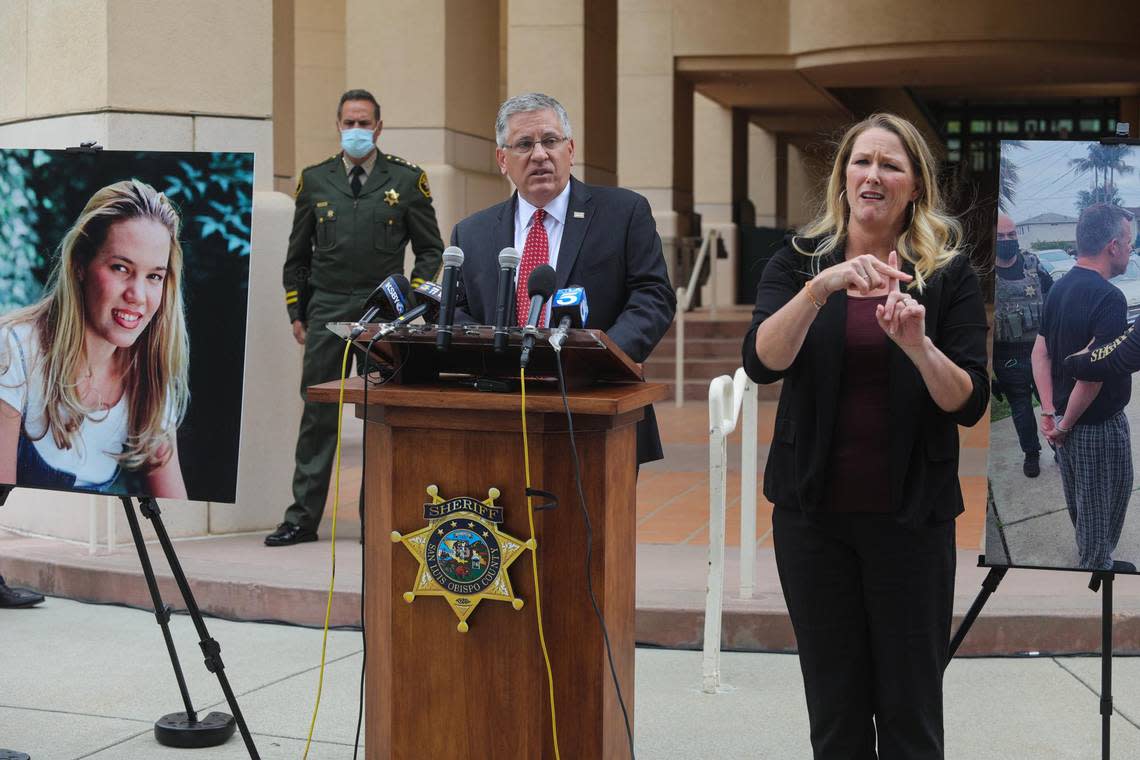Cal Poly says it can’t be sued for Kristin Smart’s murder. Here’s why

- Oops!Something went wrong.Please try again later.
Cal Poly says it cannot be sued for any alleged failures in the handling of Kristin Smart’s murder decades ago, the university claimed in a new court filing.
The Smart family sued the university in January, saying Cal Poly is partly responsible for Kristin’s murder in 1996. The lawsuit claims Paul Flores, who was convicted of her murder in October 2022, was reported to the university at least four times preceding Kristin’s death.
According to the Smart family’s lawyers, the lawsuit was sparked by Cal Poly President Jeffrey Armstrong’s first public apology, which he gave to The Tribune in an exclusive May 2023 interview.
The Smart family’s lawyers told The Tribune the apology was the first time the family realized Cal Poly may have additional information about the mishandling of Kristin’s case.
Cal Poly claimed in an April 2 court filing that the lawsuit was not viable for multiple reasons, including no proof of liability and a statute of limitations. It also claims because the Smart family filed a wrongful death lawsuit against the university in 1996, which the family lost in 1997, it cannot sue the university a second time for the same reason.
The judge in 1997 found that Cal Poly had immunity for liability because Smart’s murder “was not foreseeable in light of the absence of prior similar incidents of violent crime at the university.”
“While President Armstrong’s acknowledgment of their failings is a step in the right direction, it cannot erase the pain and injustice we have endured,” the family told The Tribune in a January statement. “Kristin was not just a statistic; she was a vibrant, intelligent young woman with a promising future. We cannot bring Kristin back, but we can demand accountability and ensure no other family suffers the same fate.”
Kristin Smart lawsuit filed too late, university is immune, Cal Poly claims
Cal Poly alleges every claim in the lawsuit violates the statute of limitations, which is two years after Smart’s disappearance.
The family is arguing a new statute of limitations opened with Armstrong’s apology in 2023, a claim the university disputes, saying the facts the lawsuit is based on occurred more than two decades ago.
“The complaint simply alleges that ‘it was the point that the Smart family began to understand Cal Poly’s failings,’” the filing said. “However, the alleged failings are not attributed to the 2023 statement.”
The lawsuit did not show a clear connection between Armstrong’s apology and the facts alleged in the complaint and did not cause the alleged failure to investigate the murder, the university said.
“Rather, the statement expressed understandable regret from the president about the situation in general,” the filing said. “There are no factual assertions to establish liability beyond the president’s own personal feelings regarding the tragedy of Kristin Smart’s death.”
Because the university believes the lawsuit violates the statute of limitations, it denied the family’s initial claim and denied the application for a late claim. The university says the Smarts did not file a petition with the court for late claim relief and filed the complaint anyway, which violates court procedure.
The lawsuit is also not viable because it argues the same claims as the lawsuit filed in 1996, the university says. The basis of the claims and issues in the current lawsuit were already disputed, the filing said, which according to court records was dismissed in favor of Cal Poly because the family failed to state any cause of action against the university and the university is immune to liability under California law — two points Cal Poly repeated in its current filing.
“The question is not whether the causes of action are named and phrased the exact same way, but instead whether they seek to recover for a violation of the same ‘primary right,” the university argued in the filing.
According to the filing, the Smart family did not prove a statutory basis for liability and is making “generalized allegations.”
The university also claimed the family could not sue for negligence or negligent infliction of emotional distress because the harm was suffered by Kristin — not family members. The university also argued only Kristin’s parents could file a wrongful death lawsuit and that her siblings could not join it.
The next hearing in the lawsuit is scheduled for Aug. 15.

